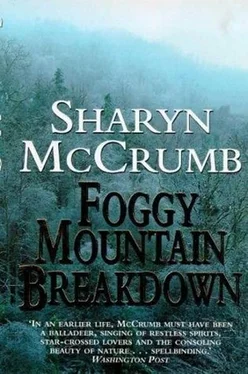Sharyn McCrumb - Foggy Mountain Breakdown and Other Stories
Здесь есть возможность читать онлайн «Sharyn McCrumb - Foggy Mountain Breakdown and Other Stories» весь текст электронной книги совершенно бесплатно (целиком полную версию без сокращений). В некоторых случаях можно слушать аудио, скачать через торрент в формате fb2 и присутствует краткое содержание. Жанр: Детектив, на английском языке. Описание произведения, (предисловие) а так же отзывы посетителей доступны на портале библиотеки ЛибКат.
- Название:Foggy Mountain Breakdown and Other Stories
- Автор:
- Жанр:
- Год:неизвестен
- ISBN:нет данных
- Рейтинг книги:3 / 5. Голосов: 1
-
Избранное:Добавить в избранное
- Отзывы:
-
Ваша оценка:
- 60
- 1
- 2
- 3
- 4
- 5
Foggy Mountain Breakdown and Other Stories: краткое содержание, описание и аннотация
Предлагаем к чтению аннотацию, описание, краткое содержание или предисловие (зависит от того, что написал сам автор книги «Foggy Mountain Breakdown and Other Stories»). Если вы не нашли необходимую информацию о книге — напишите в комментариях, мы постараемся отыскать её.
Foggy Mountain Breakdown and Other Stories — читать онлайн бесплатно полную книгу (весь текст) целиком
Ниже представлен текст книги, разбитый по страницам. Система сохранения места последней прочитанной страницы, позволяет с удобством читать онлайн бесплатно книгу «Foggy Mountain Breakdown and Other Stories», без необходимости каждый раз заново искать на чём Вы остановились. Поставьте закладку, и сможете в любой момент перейти на страницу, на которой закончили чтение.
Интервал:
Закладка:

“GERDA! KAY’S GONE!”
“Kay has been gone a long time, Niels,” I said wearily. “And you’re dripping snow on my rug.”
Niels Lausten stood there blocking my fireplace with his shivering body, while his parka rained on my caribou-skin rug. I could tell that he wasn’t going away, despite my apparent lack of interest in his news. I took a sip of my tea and read a few more lines of my book, but the sense of them never quite reached my brain, so I gave it up. I would have to hear him out, and I knew it was going to hurt, because it always did, no matter how many times I told myself that the Kay I once knew, my childhood best friend, was gone forever. I wrote him off every time one of the old gang showed up to tell me the latest about poor Kay-shameful stories about a life going down the drain in a haze of vodka, in a swirl of drunken brawls and petty acts of vandalism that seemed to gain him neither profit nor comfort. It had never made sense to me. I had tried to see him a couple of times, early on, to see if he’d accept my help, but the bleary-eyed lout who leered back at me bore no resemblance to the quiet, handsome boy next door, whose hobby had been growing roses in the window box. In the winter we used to heat copper pennies on our stoves and hold the hot pennies to the glass to melt the ice so that we could look through the peepholes and wave to each other. I thought we’d always be together, our lives as intertwined as our rose trees, but a thicker sheet of ice had grown up between us as we grew older, and nothing seemed capable of melting it. The old Kay that I’d loved was gone. I knew it. I whispered it over and over to myself like a litany. Why couldn’t I believe it? Why couldn’t Niels leave me alone to mourn?
“He’s gone, Gerda. Really.” Niels had peeled off his gloves, and now he was blowing on his fingers to warm them. He was still shaking, though, and his white face went beyond a winter pallor.
It wasn’t that cold outside. About average for a Danish winter. I wondered what else had been going on in town while I was escaping the winter at my fireside, engrossed in a book. Now that I looked at him, Niels seemed more frightened than cold. He was always a follower, always the first one to run when trouble appeared. I wondered what trouble had appeared this time.
“All right.” I sighed. “Tell me about it.”
“We were just horsing around, Gerda. We’d had a few drinks, and somebody said, ‘Wouldn’t it be fun to swipe some of the kids’ sleds and hitch them to the horse-drawn sleighs?’ That would be a real fast ride-and you wouldn’t have to keep climbing a hill in between rides. So a couple of the lads tried it, but the sleds skidded, and they fell off in a minute or so. Then we saw a different sleigh. We’d never seen it before. It was painted white, so that it blended into the snowdrifts, and the driver was wrapped in rough white fur, with a white fur hood covering the head and hiding the face. The rest of us hung back, because the sleigh was so big and fast-looking, and we couldn’t tell who was driving it. But Kay laughed at us, and said that he wasn’t afraid of a fast ride. Before we could stop him, he’d tied his sled to the runners of the white sleigh, and the thing took off like a thunderbolt. The sled was sliding all over the road behind that sleigh, but he managed to hold on. We yelled for him to roll off. He almost got run over by the horse of an oncoming sleigh. He wouldn’t turn loose. Then the white sleigh got clear of traffic and Kay was gone! We followed the tracks outside town a mile or so beyond the river, until the snow started up again, and then we lost the trail, so we came on back…” He shrugged. “So-he’s gone. I figured you’d want to know, Gerda.”
“Yeah, thanks,” I said. “Maybe I’ll ask around.”
“He’s probably dead,” said Niels.
“Yeah. He’s probably dead.” I went back to my book.
I tried to put him out of my mind, and I nearly succeeded for the rest of the winter. I kept thinking that Niels or Hans would turn up with some new story about Kay-that he was back after robbing the rich owner of the sleigh, and wilder, drunker than ever. But the town was silent under the deepening snow. I waited out the silence.
In the spring the thaws came, and the sun coaxed people back out into the streets to pass the time of day with their neighbors. They started asking each other what had become of that wild young man, Kay. Nobody had seen him since midwinter. His friends told their story about the sleigh ride, and how he never came back. “Oh, well, he must have been killed,” people said. When the ice floes broke up on the river outside town, people said that Kay’s body would come floating to the surface any day now. Surely he had drowned while crossing the river ice, trying to make his way back to town after his reckless sleigh ride. A few days later they found the wooden sled buried in a snowbank farther still from town. Kay’s hat was in a clump of melting snow nearby, but there was no sign of his body. But maybe the wolves had got him. They wouldn’t have left anything, not even a bone.
“He’s dead,” I said to the old street singer, who appears on the corner even before the birds come back.
“I don’t believe it,” he said, and went on with a warbling tune about sunshine.
“I’ll ask around,” I said. And this time I meant it.
I didn’t go to the town constable. If Kay had died in an accident, the constable would have discovered it already. If something more sinister had happened to him, the constable would be the last to know. I didn’t waste my time with official inquiries.
I went to the river. My grandmother used to tell me that the river would answer your question if you threw in one of your possessions as a sacrifice. I was tempted to try it, but before I could work myself up to that stage of desperation-or belief-I saw the old man I had come looking for. He lived in a shack downstream from the brewery, and I always wondered how he made it through the winter, dressed in his layers of reeking rags, with skin as translucent as ice under his matted hair. He grinned at me with stumps of teeth that looked like the pilings of the dock. I used to dream about him. I thought he was Kay in thirty years’ time. Maybe dead would be better. But I had to ask.
“You remember Kay? Young blond fellow. Drinking buddy of yours. He’s been gone since midwinter.”
The bloodshot eyes rolled, and the old man gave a grunt that was more smell than sound. I took it to be a yes.
“He hitched a child’s sled onto the back of a white sleigh, and it sped away with him. The word around town is that he drowned-only his body hasn’t turned up. Or maybe the wolves got him.” I could taste salt on my tongue. “Not that it matters,” I whispered.
The old derelict wet his lips, and warmed up his throat with a rheumy cough. I fished a coin out of my pocket and handed it to him. “Get something for that cough,” I muttered, knowing what he would prescribe.
“I know the white sleigh,” he rasped. “I wish it had been me.”
“You know it?”
“Ar-they call her the Snow Queen.” He flashed a gap-toothed smile. “She brings the white powder to town. Ar. Kay would like that. White powder lasts longer than this stuff.” He dug in his overcoat pocket for the nearly empty bottle, and waved it at me. “And it’s the only thing that would take the hurt away. You know about the crack, do you?”
I shook my head. “I knew Kay was in trouble. I never cared what kind of trouble. If I couldn’t help him, what did it matter?”
“The crack. That wasn’t the Snow Queen’s doing. They do say it’s mirror glass from heaven. Trolls built a magic mirror that made everything ugly. Took it up into the clouds so that they could distort the whole world at once. Got to laughing so hard they dropped the mirror. Shattered to earth in a million tiny pieces. Crack of the mirror. They do say.”
Читать дальшеИнтервал:
Закладка:
Похожие книги на «Foggy Mountain Breakdown and Other Stories»
Представляем Вашему вниманию похожие книги на «Foggy Mountain Breakdown and Other Stories» списком для выбора. Мы отобрали схожую по названию и смыслу литературу в надежде предоставить читателям больше вариантов отыскать новые, интересные, ещё непрочитанные произведения.
Обсуждение, отзывы о книге «Foggy Mountain Breakdown and Other Stories» и просто собственные мнения читателей. Оставьте ваши комментарии, напишите, что Вы думаете о произведении, его смысле или главных героях. Укажите что конкретно понравилось, а что нет, и почему Вы так считаете.












